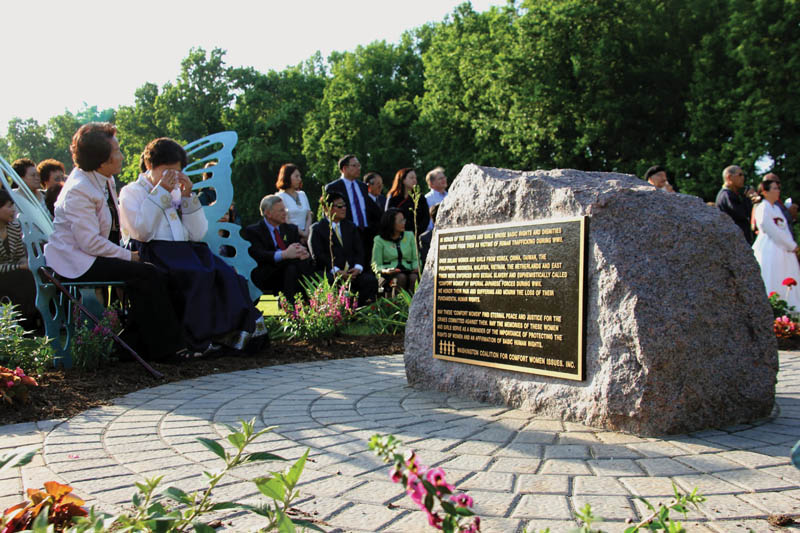story by RUTH KIM
photos by KYODO via AP IMAGES and GRETCHEN POWELL
Advocates in northern Virginia unveil a “comfort women” memorial that carries a message not just relevant to history, but very much engaged with the present.
***
In the backyard of the Fairfax County Government Center in Virginia, a brick pathway trails into a quaint, circular garden, where an unassuming boulder stands at its center. Flanked by butterfly-shaped benches of a brilliant turquoise hue, the two by-two-foot boulder displays a brass plaque, and the garden, surrounded by green grass and an open expanse, offers a moment of peace and serenity for any passerby.
However, the inscription on the plaque engages in a much more agitated conversation. In part, it reads: “In honor of the women and girls whose basic rights and dignities were taken from them as victims of human trafficking during WWII…. May these ‘comfort women’ find eternal peace and justice for the crimes committed against them. May the memories of these women and girls serve as a reminder of the importance of protecting the rights of women and an affirmation of basic human rights.”
Situated near the 9/11 Memorial Grove, the Comfort Women Memorial Peace Garden pays tribute to the girls and women, referred to euphemistically as “comfort women,” who were forced into sexual slavery by the Japanese Imperial Army during the Second World War. An estimated 80,000 to 200,000 women who were enslaved—a figure that is still being debated today—were predominantly from Korea, but included others from China, the Philippines, Burma, Thailand, Vietnam, Malaysia, Taiwan, Indonesia, the Netherlands, East Timor and other territories, where Japanese so-called comfort stations were set up to “service” soldiers at that time.
Installed by the Washington Coalition for Comfort Women Issues (WCCW), the memorial peace garden was unveiled in Fairfax, Va., on May 30 in a ceremony that featured Korean song and dance, a release of butterflies, as well as speeches by U.S. Congressman Mike Honda, Fairfax County officials and “comfort woman” survivor Kang Il-chul.
“I am grateful and excited to see you all, but somehow feel a little grief,” said Kang, 85, through a translator, expressing mixed feelings at the ceremony, which drew both smiles and tears from her.
Kang’s comments seemed to capture the overall tone of the discourse on the issue: a feeling of hope for the future, mixed with the bitter pain of the still unresolved past.
It is unresolved because the government of Japan has yet to issue a formal apology to the “comfort women” and to provide reparations to survivors, even though allegations of these war crimes first came to light in the early
1990s. The closest it came to one was a statement of “sincere apologies and remorse” delivered by the country’s chief cabinet secretary in 1993, and a private fund established to assist survivors.
But, adding fuel to the flame is the fact that over the years there have also been a number of controversial statements given by various leaders about how the “comfort women” were prostitutes, not slaves. Current Prime Minster Shinzo Abe said this past February that he wanted to revisit the evidence that led to the 1993 expression of regret. He has since back-stepped on his own statement, as tensions between South Korea and Japan have intensified.
The WCCW, a nongovernmental organization, first formed in 1992 to advocate for Japan to issue a formal
apology and provide formal reparations to the women, according to Grace Han Wolf, the group’s co-chair. But she
added that, over time, the group’s focus has shifted somewhat to emphasize “more on outreach, education and awareness building,” and that’s how the memorial idea emerged. “It’s really about making sure these women were not forgotten, making sure the crime was not forgotten, and making sure Fairfax County stands vigilant against human trafficking,” said Wolf.
Wolf, the first Korean American woman elected to office in the Commonwealth of Virginia and serving her third term on the Herndon Town Council, joined the coalition in 2012 to help facilitate the memorial’s planning. “[The WCCW] had put together this idea of a memorial after some of the other memorials had been erected in other parts of the U.S., and they weren’t really sure how to go from the idea to reality,” Wolf said. That’s where she stepped in as a liaison between the group and the local government.
The memorial serves as a reminder that this is not just a historic issue, but a contemporary one. “It’s one of those things where you think, ‘Oh, that happened so long ago,’ but, no, it’s happening right now. And that’s really where this group is really more focused on, to really educate people about what happened, and about what continues to happen,” Wolf said. “Human trafficking is still a big issue, and Fairfax just announced a big initiative in January of this year to combat teen sex trafficking, which unfortunately is still a [problem] here in Fairfax County.”
The peace garden is not the first memorial dedicated to “comfort women” to be constructed in the U.S. In 2013, a statue was erected in Glendale, Calif., portraying a girl in a hanbok sitting on a chair with an empty chair next to her; it is based on local resident and “comfort woman” survivor, Bokdong Kim. That memorial unleashed a storm of controversy. Since its installation, three delegations of Japanese politicians have complained, and Glendale’s sister city in Japan even canceled a student exchange program as a result. A group called the Global Alliance for Historical Truth filed a lawsuit in federal court to have the statue removed. Even counter petitions on the White House’s “We the People” website—one to take down and the other to keep the statue—each garnered over 100,000 signatures. Some opponents of the memorial have said that the statue promotes hate toward the people and nation of Japan, while others have said that this kind of international conflict should not be played out on American soil.
Although the Japanese Embassy and a nationalistic Japanese group have protested the Virginia memorial, Wolf said it has not sparked as much controversy as the Glendale memorial. “I think the [statue] in Glendale was probably more of a lightning rod for controversy,” she said. “The garden [here] is really positioned as awareness building not just for the history of comfort women, but more importantly the issue of human trafficking.”
She said the organization also reached out to many local community groups in the county in a conscious effort to be inclusive.
“We don’t really perceive ours as anti-Japanese nor particularly pro-Korean. We were really careful to position it that way because we didn’t want it to become just about that,” Wolf said. “The ‘comfort women’ is one of many sad stories about human trafficking, which disproportionately affects Asian American women and children. So we really took a pan-Asian approach…. We reached out to all [ethnic] groups equally. We didn’t make a special effort or not a special effort—we included everybody.”
One supporter of the Virginia memorial has been Congressman Honda, a Japanese American who spent part of World War II in an internment camp. He has also championed a congressional bill this year that called for Japan to issue an “unequivocal” apology to the “comfort women,” many of whom have already passed away. In a statement, Honda said, “For the women still alive, and for the countless who have passed, official recognition and acknowledgment is the only way to bring proper closure to this terrible chapter of World War II history.”
This article was published in the July 2014 issue of KoreAm. Subscribe today! To purchase a single issue copy of the July issue, click the “Buy Now” button below. (U.S. customers only. Expect delivery in 5-7 business days).








